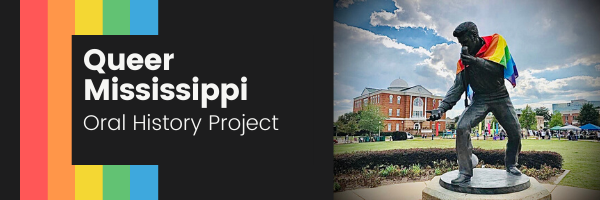
Queer Mississippi (Complete Collection)
Document Type
Audio
Loading...
Publication Date
6-26-2024
City
Oxford, MS
Abstract
In this interview, Sarah Schnaithman discusses her experiences with childhood gender transition in Texas and her legal career in Mississippi. She recounts the process of initiating legal name and gender marker changes as a transgender youth in the 1980s and ‘90s. Then, Schnaithman reveals her experience with “conversion therapy” at a residential treatment center in northern Arkansas that effectively ended her childhood gender transition. Further, she discusses the role of religion in her life, and her experience in various faiths, especially Catholicism, evangelicalism, and Unitarian Universalism. After receiving her bachelor’s degree at Baylor University, she went on to begin her teaching career, ultimately finding long-term employment as a teacher and dorm parent alongside her partner at a private school in Buffalo, New York. It was there in Buffalo, NY that she reconsidered her gender transition, and, eventually, quit her job as a teacher. She resumed her transition, starting law school at the University at Buffalo in 2019. As she narrates the process of transferring to the University of Mississippi School of Law, she illustrates her experiences with transphobia in the legal community. Finally, Schnaithman explains her involvement with various legal entities and organizations, such as her own firm, Bufete Law Firm; the ACLU; and the HRC.
Relational Format
audio recording
Extent
0:37:48
Rights
In copyright. For permission to duplicate, repost, or otherwise re-use these images, please contact the Invisible Histories Project: Mississippi.
Recommended Citation
Schnaithman, Sarah and Buck, Mae, "Schnaithman, Sarah (Part 2)" (2024). Queer Mississippi (Complete Collection). 70.
https://egrove.olemiss.edu/queerms/70
Schnaithman, Sarah Data sheet.docx (11 kB)
Schnaithman, Sarah Fieldnotes.docx (7 kB)
Schnaithman, Sarah Photo.JPEG (204 kB)
Accessibility Status
Searchable text


Comments
This is part 2 of a 4-part interview.
Additional files include: abstract, data sheet, field notes, photo. Transcript is available on request.